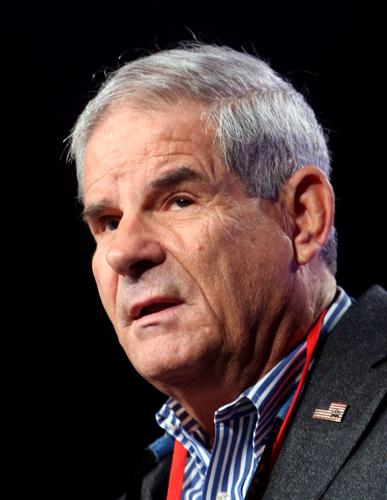An anti-Donald Trump rebellion is growing among delegates to the Republican National Convention, and Tucson’s Bruce Ash is trying to put it down.
Ash, a high-ranking member of the Republican National Committee, wrote a letter to his fellow members this week decrying appointments made to the committees that will run the convention next month. The people appointed to head the convention’s rules committee, especially, are likely to facilitate the rebellion, he argued.
The “Free the Delegates” or “Conscience Vote” movement aims to allow delegates to vote freely on the first ballot at the convention, rather than being bound to vote in a way that would automatically pick Trump, as current rules and laws require. In Arizona, at least 10 of the 58 delegates are demanding to be freed from their requirement to vote for Trump, delegate Talmage Pearce told me.
He and others are planning to challenge the state law that requires them to vote for the winner of the presidential preference election.
Ash, who heads the RNC’s permanent rules committee but not the convention rules committee, said in Wednesday’s letter: “Donald Trump might not have been our first choice, but he is the people’s choice and I support his candidacy.”
Here are a few questions I asked Ash this week, and his answers, edited for brevity.
Q: What’s the argument you made to RNC members about the appointments to lead the convention rules committee?
A: Enid Mickelsen of Utah and Ron Kaufman of Massachusetts were selected to be chairman and co-chairman of the convention rules committee. Both of them were heavily involved in Mitt Romney’s 2012 campaign. I questioned whether these two had the right optics and could be trusted not to create chaos this year at the convention rules committee.
Q: How significant is the “Conscience Vote” movement?
A: It’s a small group, but there is a ginning up of momentum that suggests this group ought to be taken seriously by the Trump campaign and the RNC. They had a phone call for delegates. The reports are a bit different depending on who you talk to: Anywhere from a few hundred to some thousands were in on the call.
This group has been whipping votes on the convention rules committee. That’s the easiest place to get votes to unbind the delegates. There’s 112 (rules committee members), you only need a little more than five dozen delegates to say that’s a good idea.
Q: Why not accommodate the delegates who want to vote their conscience and not be bound to vote for Trump?
A: Republican activists are constantly attacking Republican political leaders who campaign one way and, when they take office, govern another way. In Arizona, and in most states, the delegates to this convention were elected at the state convention, to do only one thing: to vote for the winner of the Arizona presidential preference election. How would any of us be able to look an elected official in the eye after this, the one vote we had to take, if we decided to disregard hundreds of thousands of voters?
Q: What if Arizona delegates try to vote for someone other than Trump?
A: All the Arizona delegates have signed the pledge to vote for Donald Trump. Anyone who decides they’ve got a sudden conscience they’ve developed or that they’re going to abstain, Robert Graham (Arizona’s GOP chair) will make a call up to the alternates. He’s prepared to remove a delegate to alternate status and to bring in an alternate to vote for Donald Trump.
Q: What do you want to see at the convention?
A: This should be a celebration and not a contest. The guy has 1,500 delegates. It ought to be a celebration, which is what these things are all the time. Not a contest, not a conflict.
Hernandez not UA grad
Daniel Hernandez Jr. has referred to himself over the years as a UA graduate. The Green Valley News reported over the weekend, and I confirmed this week, that actually he’s not.
Hernandez, a Democrat who is running for the state House of Representatives in District 2, still had on his campaign website Thursday afternoon a reference to himself as a “University of Arizona alumni.” But he acknowledged to me Thursday that he is one class short of a bachelor’s degree and plans to take that class this summer.
“I’m not intentionally trying to deceive anyone,” Hernandez said. “I’m committed to fixing that mistake.”
He plans to take an online math class that will allow him to complete his coursework over a five week period starting next month.
Two other Democrats, incumbent Rosanna Gabaldon and Aaron Baumann, are also running in the August primary for the two available seats.
Grijalva sitting in
The urge to “do something” about the mass shootings in this country is natural. So it’s not that surprising that Democrats like our own Rep. Raúl Grijalva got radical in their effort to force action, by conducting a 24-hour sit-in on the House floor.
I asked Grijalva’s office to have the congressman call me to explain what he wanted out of the sit-in, but I didn’t hear from him. The members who started the sit-in said they wanted votes on one bill that would prevent people on the no-fly list from buying guns and another that would expand background checks.
The fact is, though, that the no-fly-list bill is troubling, because that list of people who aren’t allowed to fly due to concerns about their possible links to terrorism is notoriously opaque. Even Rep. John Lewis, who led the sit-in Wednesday, was treated as a potential terrorist in airports because of his name mistakenly being on the list.
So rather than demanding a vote on a bill that would codify that troubling list, I’d like to have seen Grijalva & Co. fix the list first. In fact, such efforts are happening in the Senate.
County attorney debate
For weeks, Pima County Attorney candidate Joel Feinman has been pointing out incumbent Barbara LaWall’s unwillingness to debate him at a series of scheduled events. Feinman, a Democrat like the incumbent he’s challenging, has even posted online a “LaWall debate clock” showing the events he says she’s ignored or declined to attend.
On Thursday, I asked LaWall why she’d missed the events. She stressed that she has never skipped an event she’d agreed to attend and in fact has attended a candidate forum Feinman also attended. But she acknowledged, “It’s true I’ve declined to debate.”
Her reason veers dangerously close to a sense of entitlement: “I believe the circumstances of this race are different. This is not an open seat. My record is well known.”
“My opponent has no record to debate on. He has no qualifications to do the job,” she said.
It’s true that Feinman has never been a prosecutor, but I’m not sure Democratic voters will accept that reasoning.






